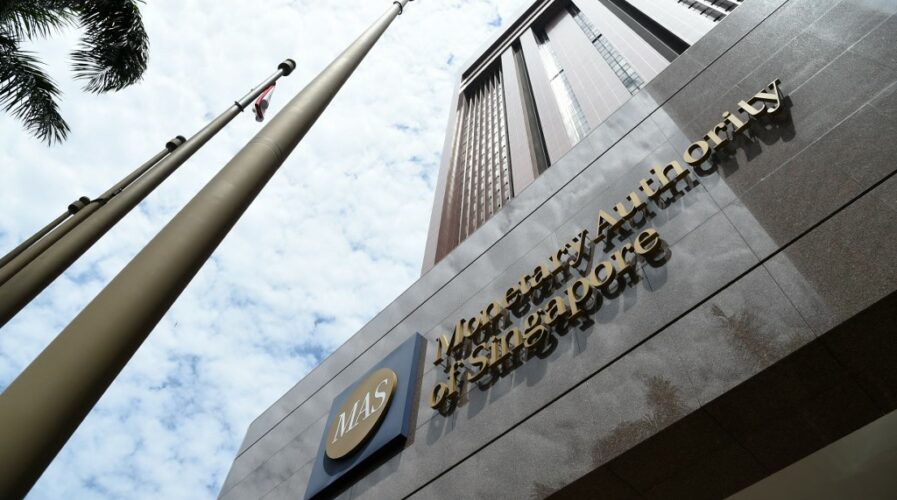
The global CBDC challenge by the Monetary Authority of Singapore and its partners aims to find solutions for retail CBDCs (Photo by ROSLAN RAHMAN / AFP)
Global CBDC challenge invites fintech players – deadline extended
- 12 problem statements to be solved across three key areas
- Seeks solutions for retail CBDCs
- Three winners will be selected — prize of SG$ 50,000 each
- Top 15 will receive mentorship
- Deadline for submissions extended from 23 to 30 July
Central bank digital currencies (CBDC), have seen increased interest by governments in recent times. Last June, the Monetary Authority of Singapore (MAS) launched a global challenge seeking solutions for retail CBDCs. Originally set for 23 July, MAS has extended submissions to 30 July.
The worldwide challenge seeks to innovate retail CBDC solutions to enhance payment efficiencies and promote financial inclusion.
Fintech companies, financial institutions, and solution providers are invited to submit proposals addressing 12 problem statements centered around three key areas. These problem statements were curated from suggestions received from partner organizations across the world. The three key areas include:
- CBDC Instrument,
- CBDC Distribution, and
- CBDC Infrastructure
According to MAS, retail CBDC built for next-generation financial rails has the potential to increase payments efficiencies, improve financial inclusion, and support the broader digitalization drive in the economy. However, the design and technology underpinning retail CBDC solutions need to meet a number of public policy objectives:
The proposed solution should be cost-effective to implement while addressing both current and anticipated future payment needs of the consumer;
- It must be accessible to a full spectrum of users, including lower-income households and those who are less tech-savvy
- The design of the retail CBDC solution should contribute to financial system resilience and integrity, and be consistent with monetary and financial stability.
Cross-border trade improvement with CBDC
A recent report released by the Bank for International Settlements (BIS) re-asserted their position that CBDCs can be a good supplement to a competitive monetary system and explored CBDC designs that nations can consider adopting. The BIS also recommended that CBDCs keep up with digitalization trends, and emphasized the importance of identity and high security.
Kanv Pandit, Group Managing Director, Asia Pacific, Banking Solutions, FIS, commented that “moving money across borders and converting those payments into foreign currencies can be both complex and costly. Currently, cross-border payments involve bridging the closed loops of multiple currencies and domestic payment systems.
“This, coupled with the complexities presented by the world’s many regulatory jurisdictions, means they are inherently more challenging to resolve.”
Pandit also added that apart from the easier transfer of money across borders, CBDCs also have the potential to create new efficiencies for banks as they reduce costs and boost productivity for cash management.
Additionally, as CBDCs offer a higher level of control and traceability, unlike cash and private cryptocurrencies. This allows for better monitoring of financial activity making crimes such as tax evasion and money laundering practices much more difficult.
Importantly, CBDCs will also broaden financial inclusion, allowing access to cash and funds to more people around the world, particularly in emerging economies.
This sentiment is similar to BIS’, which impressed the point that CBDCs can improve cross-border trade. According to the BIS, having international cooperation on CBDC design is vital if central banks are to harness its full benefits to improve cross-border payments while countering foreign currency substitution.
“Through the Global CBDC Challenge, MAS hopes to encourage innovator communities worldwide to develop and showcase solutions that can maximize the potential of CBDC to deliver efficiencies to payment services, improve financial inclusion, consistent with central banks’ core mandate of monetary stability”, said Sopnendu Mohanty, Chief FinTech Officer of MAS.
Addressing CBDC teething issues
According to Pandit, some of the major discussions surrounding CBDCs include addressing its classification in the financial ecosystem, and its impact and interaction with other forms of money. These ought to be addressed before CBDCs can enter circulation, as well as addressing legal and technical considerations.
“As with most new products and services banks are planning to launch, the process is methodical, and the actual implementation takes time – getting to the point of offering CBDCs to customers is a bit of a slow climb. However, it will be a game-changer once CBDCs prevail and reach mainstream use, bringing about a rapid shift to the banking and payments ecosystem.”, he added.
Singapore recently concluded a successful cross-border trial on multi-CBDCs with BIS, dubbed “Project Dunbar”. Project Dunbar, which builds on their previous “Project Ubin”, explores different governance and connectivity models for cross-border transactions using multi-CBDCs that could form the basis of a future international settlement network.
How to get involved in the challenge
Up to 15 finalists of the challenge will be selected to receive mentorship from industry experts and be given access to the APIX Digital Currency Sandbox for rapid prototyping of digital currency solutions. Finalists will pitch their solutions to a global audience on Demo Day to be held on 8 November at the Singapore FinTech Festival. Up to three winners will be selected, with each receiving S$50,000 in prize money.
The Global CBDC challenge was launched by MAS in partnership with the International Monetary Fund (IMF), World Bank, Asian Development Bank (ADB), United Nations Capital Development Fund (UNCDF), United Nations High Commission for Refugees (UNHCR), United Nations Development Programme (UNDP), and the Organisation for Economic Co-operation and Development (OECD).
Parties who are interested can register at their website.
READ MORE
- Strategies for Democratizing GenAI
- The criticality of endpoint management in cybersecurity and operations
- Ethical AI: The renewed importance of safeguarding data and customer privacy in Generative AI applications
- How Japan balances AI-driven opportunities with cybersecurity needs
- Deploying SASE: Benchmarking your approach
